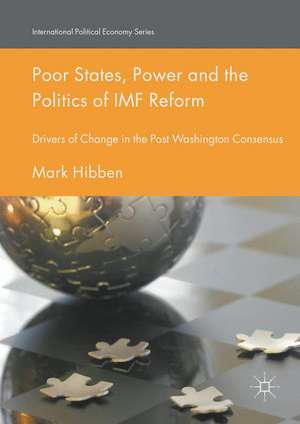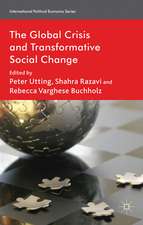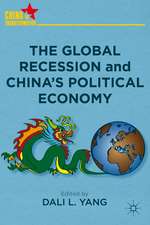Poor States, Power and the Politics of IMF Reform: Drivers of Change in the Post- Washington Consensus: International Political Economy Series
Autor Mark Hibbenen Limba Engleză Hardback – 17 iun 2016
This books provides a timely comparative case study that reveals the factors driving the International Monetary Fund's policy reform in Low Income Developing Countries (LIDCs), as a resurgent IMF expands its footprint in the world's poorest states. Through a research design that employs both mainstream and critical IPE theory, Mark Hibben uncovers three major tendencies. Principal-agent analysis, he argues, demonstrates that coalition formation among powerful states, IMF staff and management, and other influential actors is necessary for policy reform. At the same time, he uses constructivist analysis to show that ideational frameworks of what merits appropriate macroeconomic policy response also have an impact on reform efforts, and that IMF management and staff seek legitimacy in their policy choices. In response to the crises in 1999 and 2008, the author maintains, poverty and inequality now 'matter' in IMF thinking and serve as an opportunity for policy insiders and external actors to deepen the institution's new commitment to 'inclusive' growth. Finally, Hibben draws on neo-Gramscian analysis to highlight how the IMF looked to soften the destabilizing effects of globalization through reforms focused on stakeholder participation in poor states and will continue to do so in its support of the new United Nation Sustainable Development Goals. This means that the 2015-2030 time period will be a critical juncture for IMF LIDC reform. By drawing from diverse theoretical traditions, the author thus provides a unique framework for the study of contemporary IMF change and how best those interested in LIDC policy reform can meet this objective.
Din seria International Political Economy Series
- 9%
 Preț: 831.25 lei
Preț: 831.25 lei - 20%
 Preț: 751.84 lei
Preț: 751.84 lei - 17%
 Preț: 490.25 lei
Preț: 490.25 lei - 17%
 Preț: 363.48 lei
Preț: 363.48 lei - 20%
 Preț: 690.96 lei
Preț: 690.96 lei - 20%
 Preț: 627.55 lei
Preț: 627.55 lei - 9%
 Preț: 762.80 lei
Preț: 762.80 lei -
 Preț: 430.59 lei
Preț: 430.59 lei -
 Preț: 428.68 lei
Preț: 428.68 lei -
 Preț: 147.23 lei
Preț: 147.23 lei - 20%
 Preț: 566.64 lei
Preț: 566.64 lei -
 Preț: 385.08 lei
Preț: 385.08 lei -
 Preț: 389.11 lei
Preț: 389.11 lei - 15%
 Preț: 644.30 lei
Preț: 644.30 lei -
 Preț: 389.31 lei
Preț: 389.31 lei - 15%
 Preț: 644.30 lei
Preț: 644.30 lei -
 Preț: 413.84 lei
Preț: 413.84 lei -
 Preț: 387.38 lei
Preț: 387.38 lei - 15%
 Preț: 638.89 lei
Preț: 638.89 lei - 15%
 Preț: 644.63 lei
Preț: 644.63 lei - 18%
 Preț: 893.71 lei
Preț: 893.71 lei -
 Preț: 412.47 lei
Preț: 412.47 lei -
 Preț: 325.08 lei
Preț: 325.08 lei -
 Preț: 395.47 lei
Preț: 395.47 lei - 15%
 Preț: 641.85 lei
Preț: 641.85 lei -
 Preț: 391.40 lei
Preț: 391.40 lei -
 Preț: 388.34 lei
Preț: 388.34 lei - 15%
 Preț: 640.55 lei
Preț: 640.55 lei -
 Preț: 389.70 lei
Preț: 389.70 lei - 15%
 Preț: 646.30 lei
Preț: 646.30 lei - 15%
 Preț: 637.78 lei
Preț: 637.78 lei - 15%
 Preț: 643.84 lei
Preț: 643.84 lei -
 Preț: 386.99 lei
Preț: 386.99 lei - 15%
 Preț: 641.53 lei
Preț: 641.53 lei -
 Preț: 386.81 lei
Preț: 386.81 lei - 15%
 Preț: 639.73 lei
Preț: 639.73 lei - 18%
 Preț: 944.19 lei
Preț: 944.19 lei -
 Preț: 391.40 lei
Preț: 391.40 lei -
 Preț: 330.65 lei
Preț: 330.65 lei -
 Preț: 394.12 lei
Preț: 394.12 lei -
 Preț: 386.99 lei
Preț: 386.99 lei -
 Preț: 386.81 lei
Preț: 386.81 lei -
 Preț: 387.75 lei
Preț: 387.75 lei - 15%
 Preț: 634.68 lei
Preț: 634.68 lei -
 Preț: 392.60 lei
Preț: 392.60 lei - 15%
 Preț: 641.53 lei
Preț: 641.53 lei - 15%
 Preț: 640.06 lei
Preț: 640.06 lei - 15%
 Preț: 643.16 lei
Preț: 643.16 lei - 15%
 Preț: 642.68 lei
Preț: 642.68 lei - 15%
 Preț: 641.85 lei
Preț: 641.85 lei
Preț: 640.55 lei
Preț vechi: 753.60 lei
-15% Nou
Puncte Express: 961
Preț estimativ în valută:
122.59€ • 127.51$ • 101.20£
122.59€ • 127.51$ • 101.20£
Carte tipărită la comandă
Livrare economică 14-28 aprilie
Preluare comenzi: 021 569.72.76
Specificații
ISBN-13: 9781137577498
ISBN-10: 1137577495
Pagini: 192
Ilustrații: XV, 185 p. 10 illus., 7 illus. in color.
Dimensiuni: 148 x 210 x 16 mm
Greutate: 0.42 kg
Ediția:1st ed. 2016
Editura: Palgrave Macmillan UK
Colecția Palgrave Macmillan
Seria International Political Economy Series
Locul publicării:London, United Kingdom
ISBN-10: 1137577495
Pagini: 192
Ilustrații: XV, 185 p. 10 illus., 7 illus. in color.
Dimensiuni: 148 x 210 x 16 mm
Greutate: 0.42 kg
Ediția:1st ed. 2016
Editura: Palgrave Macmillan UK
Colecția Palgrave Macmillan
Seria International Political Economy Series
Locul publicării:London, United Kingdom
Cuprins
1. The IMF, LIDC Reform and the post Washington Consensus
1.1. What drives post Washington Consensus IMF LIDC reform and why does it matter
1.2. Contested areas of IMF LIDC policy in the post 2008 era
1.3Who are the LIDCs
1.4Organization, research design, and findings
2. The IMF and LIDCs
2.1Mandate, quota system, and organizational structure
2.2Organizational structure
2.3Lending facilities, FSAPs and the PSI
2.4Operational culture
2.51944-1952: The Bretton Woods framework and the rise of IMF conditionality
2.61953-1961: IMF ‘common sense’, the Polak Model, and SBAs
2.71962- 1971: Push back, early concessionary lending, and LIDC technical assistance
2.81971-1996: Breakdown of Bretton Woods and the Washington Consensus
2.9Conclusion
3. Theorizing post Washington Consensus LIDC Reform
3.1What influences IMF policy?
3.2Theorizing IMF LIDC reform: A rationalist approach
3.3Theorizing IMF LIDC reform: A constructivist approach
3.4Theorizing IMF LIDC reform: A historical structural approach
3.5Conclusion
4. The HIPC and HIPC II Initiatives
4.1Setting the stage for HIPC and HIPC II: The breakdown of Bretton Woods hegemony
4.2The Mexican Debt crisis, demand compression, and structural market reform
4.3From bilateral debt restructuring to debt reduction
4.4Rethinking IMF LIDC debt forgiveness: the HIPC initiative
4.5‘Faster, deeper, and broader debt relief’ with poverty reduction: the HIPC II
4.6Conclusion
5. ‘Pro-Poor’ Concessionary Lending: The PRGF
Notă biografică
Mark Hibben is Assistant Professor of Political Science at Saint Joseph’s College of Maine, USA.
Textul de pe ultima copertă
Series Editor: Timothy M. Shaw, Visiting Professor, University of Massachusetts Boston, USA and Emeritus Professor, University of London, UK
This books provides a timely comparative case study that reveals the factors driving the International Monetary Fund's policy reform in Low Income Developing Countries (LIDCs), as a resurgent IMF expands its footprint in the world's poorest states. Through a research design that employs both mainstream and critical IPE theory, Mark Hibben uncovers three major tendencies. Principal-agent analysis, he argues, demonstrates that coalition formation among powerful states, IMF staff and management, and other influential actors is necessary for policy reform. At the same time, he uses constructivist analysis to show that ideational frameworks of what merits appropriate macroeconomic policy response also have an impact on reform efforts, and that IMF management and staff seek legitimacy in their policy choices.In response to the crises in 1999 and 2008, the author maintains, poverty and inequality now 'matter' in IMF thinking and serve as an opportunity for policy insiders and external actors to deepen the institution's new commitment to 'inclusive' growth. Finally, Hibben draws on neo-Gramscian analysis to highlight how the IMF looked to soften the destabilizing effects of globalization through reforms focused on stakeholder participation in poor states and will continue to do so in its support of the new United Nation Sustainable Development Goals. This means that the 2015-2030 time period will be a critical juncture for IMF LIDC reform. By drawing from diverse theoretical traditions, the author thus provides a unique framework for the study of contemporary IMF change and how best those interested in LIDC policy reform can meet this objective.
Mark Hibben is Assistant Professor of Political Science at Saint Joseph’s College of Maine, US
















